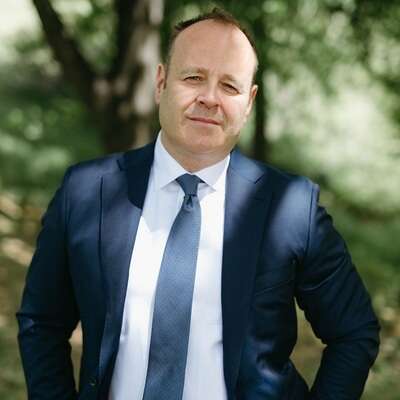In a recent thought-provoking discussion panel hosted by Boyden Ireland, experienced senior leaders and accomplished C-suite executives gathered to explore the next stage of their careers beyond executive leadership, sharing insights and solutions on the transition into the boardroom.
The event featured notable speakers, including Caroline Dowling, Board Director & Board Advisor, Patrick Jordan, Executive Chairman of Atlantic Aviation Group, and Mark Gantly, Independent Consultant and Adjunct Professor of Management at the National University of Ireland, Galway.
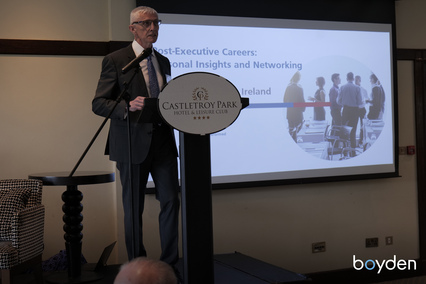
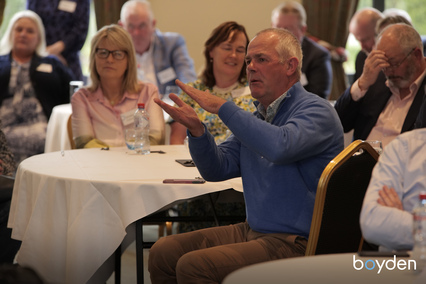
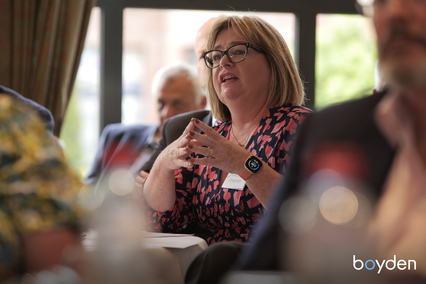
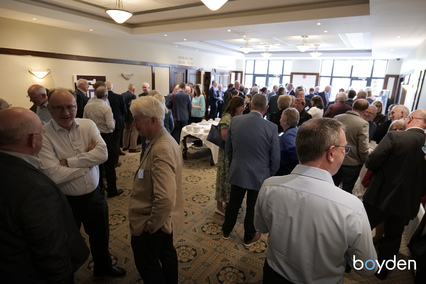
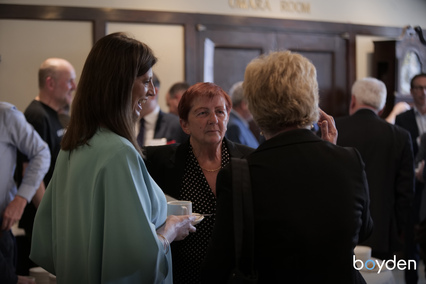
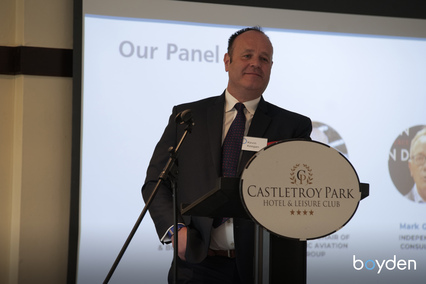
The dialogue provided crucial insights for senior leaders and executives, emphasizing the significance of introspection, network rebuilding, and aligning career moves with personal values. Understanding evolving board expectations and exploring interim management were also highlighted as key considerations. Here, we expand on the key learnings:
Give yourself time
Senior leaders are accustomed to the ‘fast and furious’ rhythm of corporate life. However, Caroline Dowling stressed the importance of executives giving themselves time when they move away from the executive world to consider what they really want and how to regenerate their energy and engagement. Caroline took a full year out to recharge her batteries, which is crucial, and to think about what she really wanted. Caroline was a global CEO for many years, so she reconnected with her future needs and motivators by doing something completely different, like gardening!
Caroline adds, “As you move forward it will be important to block off ‘sacred time’. In a portfolio career, you can easily be drawn into the equivalent of a full-time executive role across a number of organisations, and if this transition is an intentional change, you need to protect your time.”
Rebuild your connections
Leadership is all-consuming, and your attention may not have benefited networks while you were on the front lines. Also, international leaders may have had to leave networks behind.
“I had lost some of my connections due to being outside of Ireland,” commented Caroline. “So, I needed to spend time creating an action plan that recognised the importance of network and how to regenerate mine.”
Mark Gantly adds, “All of a sudden you are not a revered, senior executive anymore, so you need to do what everyone does – ask for help. Ring up a friend who’s on a board, ask them how they did it, if they have any ideas or connections they can share”.
LinkedIn is an important tool for building connections. “This is a 24/7 shop front so it is important to have it updated and properly reflective of your interests,” says Kevin Keegan, Partner, Boyden Ireland. “Monitor what people you admire are doing and comment on posts that interest you in order to establish a genuine presence."
Patrick cautions against a pure online focus. “Don’t just invest online, set realistic goals for in-person meetings – say, meet three to five people this week”.
It is easy to stick to the same demographics you know and are comfortable with. However, making this transition is an opportunity for a different adventure.
Mark advises, “Building a broad network will enable you to see where you want to put your efforts; the broader the network, the greater the opportunity to give back”.
Match your next move to your values
It’s important to think carefully about your values and where best they align in terms of organisations and industries in which you would like to get involved.
"There is great value in having a mix of paid and non-paid board work in your portfolio," says Mark. “In my experience, unpaid work is just as fulfilling, if not more so, than paid work."
Volunteering and serving on non-profit boards are both excellent ways to gain experience. It must be the right people for you, as well as the right organisation and values. This will also take time, and you may have to learn to say "no" to some opportunities.
“You do need to review your portfolio at regular intervals to make sure it is still aligned with your personal motivations and that it is providing you with a distinct lifestyle compared with being in the executive,” continues Mark. “It is easy to fall back into the old rhythm, so check in with yourself every six to twelve months – almost like having an investment review, except this is about your expertise and your time”.
What are boards looking for?
Boards are now looking for more specific skills and competencies, particularly in functional areas such as digital, HR and change management. “A lot of companies don’t have a board and we see a need for more companies today to have senior advisors acting as independent board members,” explains Boyden’s Kevin.
Boards are also looking for more diversity. "Boyden is well positioned to move the needle here, with both a global and local commitment to assisting clients in driving more innovation, promoting diversity of thought, and strategic flexibility." says Linda Roberts Power, Delivery and Operations Director, Boyden Ireland.
There are just a few experts in board recruitment in Ireland, primarily global firms such as Boyden, with strong local capabilities. “Get to know the players!” advises Caroline.
What about Interim management?
Post executive transition can also be a great time to become an interim manager. “Interim management is a great way of leveraging a lifetime of expertise,” comments Boyden’s Linda.
“It’s a very satisfying role that can be a commitment for just a few weeks, to a few months, with clearly defined goals. The catalyst for an interim leader can either be event-driven, such as preparing for an IPO, or the need for high-level specialist capabilities that are more affordable off-balance sheet, or an executive search that requires time, bought by an interim leader. It can also be a great solution in succession planning, where the interim leader can provide a lot of expertise on the type of leader the organisation requires, particularly in a restructuring situation.”
Summing up the event, Patrick Jordan, Executive Chairman of Atlantic Aviation Group, concludes, “I was delighted to participate on the very interesting topic of the benefit of and the recruitment journey of non-executive directors. Great to share the podium with two other NEDS from very different business backgrounds who shared their story with the audience - Caroline Dowling and Mark Gantly. Large turnout in Castletroy hotel indicated the relevance of the topic, with grey heads in the audience that could unlock potential in many local companies.”
“This is true,” says Boyden’s Maurice Carr, Partner. “It’s important for businesses to be creative in how they design latter stage careers, through succession planning and developing mutually beneficial employment models that work for organisations and individuals.”
“We have seen in the US and the UK valuable leaders being lost as baby boomers leave corporate life; that’s now happening in Ireland. We want to learn from their mistakes and protect businesses here to help them anticipate change and optimise the experience available to benefit both the businesses and individual executives”.
Watch Event Highlights
Get a first-hand look at the memorable moments from our panel event:
To further discuss how you can leverage interim, non-executive or leadership consulting solutions contact:
Linda Roberts Power, Delivery and Operations Director, Boyden Ireland
Maurice Carr, Partner, Boyden Ireland
Kevin Keegan, Partner, Boyden Ireland
If you would like to join our network for future events, we’d love to hear from you. Please contact:
Linda Roberts Power, Delivery and Operations Director, Boyden Ireland



